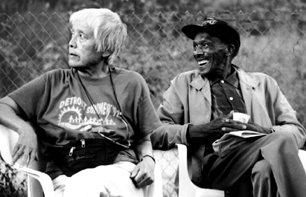
I watched Paris is Burning with some folks just a couple of nights ago. It was a documentary about drag queens in NYC during the 1970s. It talked about how communities, and second families were formed among transgender folks who were ostracized from their own homes. There were such things called "balls" where folks dressed up and competed with one another. The point was to be something you were not, and assimilate into that role convincingly. The film showed how this dynamic of assimilation was not only gendered, in that biological men were dressed as women, but also racialized. Most of the people interviewed in the film were men of color who were trying to dress "white," which was seen as white middle-class, corporate, successful. It shows the degree to which the high-white-life is elusive to many everyday people.
The film also contrasted the sense of family that mainly transfolks felt among one another, with the violent brutality that they faced from the larger public. I am paraphrasing what one of the interviewees said, but it was a reference to why the "balls" that are described above, are so important to drag men. Trans folks abilities to disguise themselves completely in the opposite gender determined if they were to live or to die. In other words, if drags werent convincingly disguised as women, and were found out, then they were often targets of severe hate crimes. The film also showed how the poverty and isolation that many trans folks during that period were facing, led to prostitution being a means of survival. One of the main characters in the documentary was strangled while she was presumably with a client -- being drag and prostitute meant high-risk exposure to anti-trans and anti-gay hate crimes.
Watching Paris Is Burning, set in 1970s New York, makes me wonder what the relationship between queer people of color circles in NYC, and militant racial movements. I wonder if they came together at some point. Marlon Riggs, apparently has a film called Anthem, where he discusses the queer presence in the Black Power movement. Folks like Cherrie Moraga, a lesbian Chicana playwright, had written about the notion of a Queer Aztlan, which finds itself under attack not only from white supremacists who are against the liberation of people of color, but also attack from straight, heterosexist Chicano nationalists who see queer folks as a betrayal of the nation....Moraga's play, Hungry Woman, is a powerful discussion of these themes, although I must say that when I last heard Moraga speak, she was way too much into identity politics for me. Her message was circling around identity so much that it seemed to have lost a class analysis that I remembered vaguely to be there when I was delving into the works by radical women of color, such as This Bridge Called My Back.
This it for now.
peace
JOMO





1 comment:
hi jomo, i am looking for some study of the iww starbucks union research, i dont know if you have any resource? i want to do a report (20 pages) about the starbucks union campaign over the years. let me know, thanx!
Post a Comment